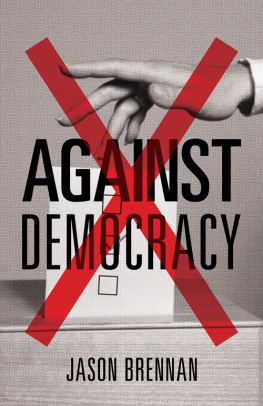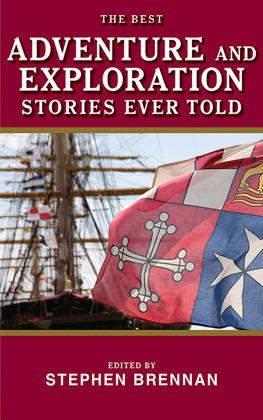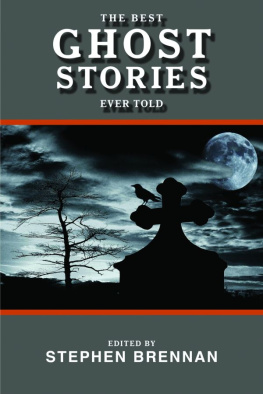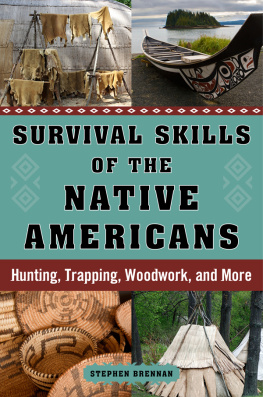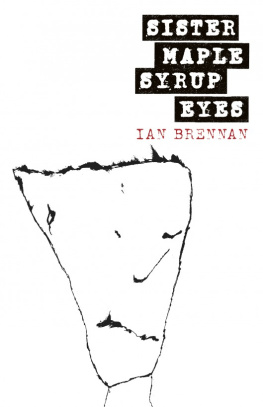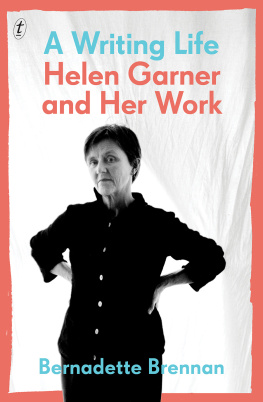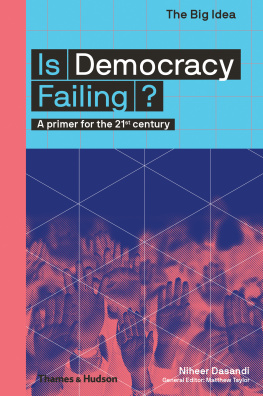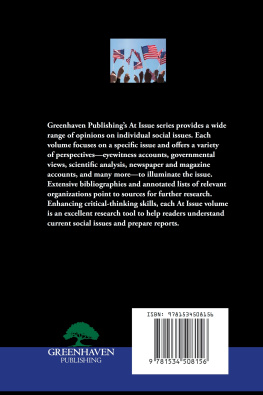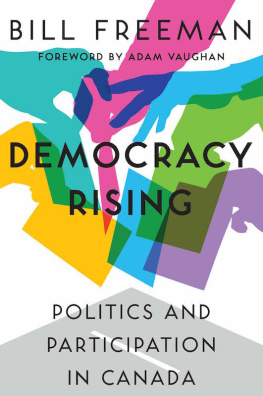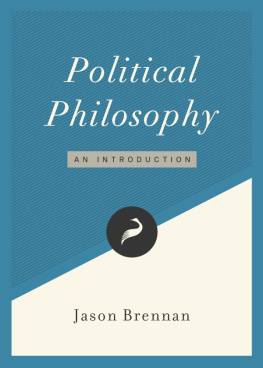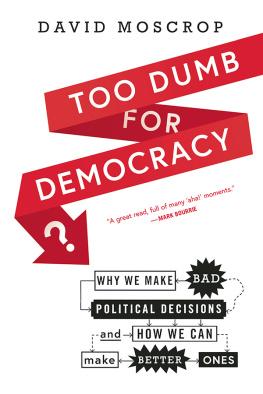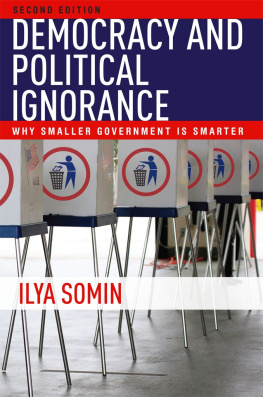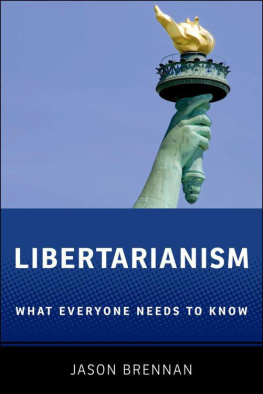AGAINST DEMOCRACY
AGAINST DEMOCRACY
JASON BRENNAN
PRINCETON UNIVERSITY PRESS
Princeton and Oxford
Copyright 2016 by Princeton University Press
Published by Princeton University Press
41 William Street, Princeton, New Jersey 08540
In the United Kingdom: Princeton University Press
6 Oxford Street, Woodstock, Oxfordshire OX20 1TR
press.princeton.edu
Jacket design by Faceout Studio.
All Rights Reserved
Library of Congress Cataloging-in-Publication Data
Names: Brennan, Jason, 1979 author.
Title: Against democracy / Jason Brennan.
Description: Princeton : Princeton University Press, [2016] | Includes bibliographical references and index.
Identifiers: LCCN 2016001826 | ISBN 9780691162607 (hardcover : acid-free paper)
Subjects: LCSH: DemocracyPhilosophy. | Knowledge, Theory ofPolitical aspects. | ExpertisePolitical aspects.
Classification: LCC JC423. B7834 2016 | DDC 321.8dc23
LC record available at http://lccn.loc.gov/2016001826
British Library Cataloging-in-Publication Data is available
This book has been composed in Sabon Next LT Pro and Univers LT Std
Printed on acid-free paper.
Printed in the United States of America
10 9 8 7 6 5 4 3 2 1
CONTENTS
PREFACE AND ACKNOWLEDGMENTS
Ten years ago, I found most philosophical democratic theory perplexing. To me, philosophers and political theorists seemed too impressed with symbolic arguments for democracy. They constructed highly idealized accounts of the democratic process that bore little semblance to real-world democracy. These kinds of ideas seemed entirely unmotivated. Politics isnt a poem, I thought, and under those ideal conditions, wed want to be anarchists, not democrats.
Later I realized that my dissatisfaction with philosophical democratic theory was a reason to work in the field rather than one to avoid it. At the very least, democratic theory needs someone to play devils advocate. Although Im happy to play that role, in true devilish fashion I now doubt whether Im defending the devil, and philosophers and political theorists are defending the angels.
Many of my colleagues entertain a somewhat romantic view of politics: politics brings us together, educates and civilizes us, and makes us civic friends. I see politics as doing the opposite: it pulls us apart, stultifies and corrupts us, and makes us civic enemies.
Against Democracy is in a sense the third part in a trilogy of books, including 2011s The Ethics of Voting and 2014s Compulsory Voting: For and Against. While Against Politics takes up themes from the other two, it defends the most ambitious claims. My half of Compulsory Voting argues that compulsory voting is unjustified. The Ethics of Voting maintains that the best ways to exercise civic virtue occur outside politics, and that most citizens have a moral obligation to refrain from voting, even if they have a right to vote. This work goes further. For that reason, if the reasoning here fails, that doesnt mean the arguments in the other books do. Here Ill contend that if the facts turn out the right way, some people ought not have the right to vote, or ought to have weaker voting rights than others.
I thank my editor at Princeton University Press, Rob Tempio, for suggesting I take up what became one of the major themes of this book: politics is bad for us, and most of us should, for the sake of our characters, minimize our involvement. (This may or may not be something Rob agrees with.) I thank Geoffrey Brennan for suggesting I pursue the second major theme: in light of widespread voter incompetence, epistocracy is superior to democracy. A few years ago, after reading The Ethics of Voting, Geoff asked me, If voters are that bad, why should we put up with democracy at all? My attempt to answer that question led to a series of articles and ultimately the present work. (Again, Geoff probably does not agree, but he thought I should explore the argument.)
Most of the material here is new, but it draws significantly on, and in some cases incorporates large parts of, my previously published material, including the following articles and anthology chapters: The Right to a Competent Electorate, Philosophical Quarterly 61 (2011): 700724; Political Liberty: Who Needs It? Social Philosophy and Policy 29 (2012): 127; Epistocracy and Public Reason, in Democracy in the Twenty-First Century, eds. Ann Cudd and Sally Scholz (Berlin: Springer, 2013), 191204; and How Smart Is Democracy? You Cant Answer That A Priori, Critical Review 26 (2014): 430.
Its important to note one deliberative omission: one of the popular arguments for democracy and against epistocracy is that epistocracy is supposedly incompatible with public reason liberalism. I decided against taking on that claim here for two reasons. First, Im deeply skeptical of the public reason project, but I didnt want to devote half a book to debating it. Second, as Ive already argued (Brennan 2013), epistocracy and public reason liberalism are in fact compatible. Since public reason liberals havent yet responded to that contention, I didnt have anything new to add here.
Thanks to audiences at La Sierra University, the University of Buffalo, Cal State at Sacramento, the Public Choice Society, Wellesley College, Duke University, the American Political Science Association, Charles Sturt University, the Center for Applied Philosophy and Public Ethics, Australian National University, Georgia State University, James Madison University, the Wharton School of Business, Hamden-Sydney College, the University of Richmond, the Association of Private Enterprise Education, Linfield College, Bowling Green State University, the University of North Carolina at Chapel Hill, and Christopher Newport University for their valuable feedback on many of the arguments presented in this book.
For countless valuable discussions of this topic over the years, I especially thank Geoffrey Brennan, Bryan Caplan, David Estlund, Loren Lomasky, and Ilya Somin. Also, I greatly thank John Beverley, Jon Houston, Sean McNamara, Jake Monaghan, Paul Poenicke, and Yonatan Schreiber of the Lawless Buffalo group at the University of Buffalo for hosting a workshop on an early draft. Im also grateful to Scott Althaus, Richard Arneson, Neera Badhwar, Christian Barry, Peter Boettke, Trevor Burrus, Elizabeth Busch, Sam Clark, Andrew I. Cohen, Andrew J. Cohen, Daniel Cohen, Ross Corbett, Ann Cudd, Richard Dagger, Vladimiros Dagkas-Tsoukalas, Ryan Davis, Christopher Freiman, Jeffrey Friedman, Michael Fuerstein, Gerald Gaus, Robert Goodin, Paul Gowder, Robert Gressis, Lisa Hill, John Holstead, Peter Jaworski, Hlne Landemore, Daniel Layman, Seth Lazar, Andrew Lister, Loren Lomasky, Aaron Maltais, Steven Maloney, Simon Cabulea May, Pierre Moraro, Tom Mulligan, Michael Munger, Guido Pincione, Aaron Powell, Dennis Quinn, Henry Richardson, Christian Rostbll, Ben Saunders, Geoffrey Sayre-McCord, David Schmidtz, Kyle Swan, Fernando Tesn, John Tomasi, Kevin Vallier, Bas van der Vossen, Steven Wall, and Matt Zwolinski.
Thanks finally to two anonymous referees, who helped turn this into a better work.
AGAINST DEMOCRACY
CHAPTER 1
HOBBITS AND HOOLIGANS
American revolutionary and president John Adams said, I must study politics and war that my sons may have liberty to study mathematics and philosophy. My sons ought to study mathematics and philosophy, geography, natural history, naval architecture, navigation, commerce, and agriculture, in order to give their children a right to study painting, poetry, music, architecture, statuary, tapestry, and porcelain. Adams was a political animal if ever there was one, but he hoped future generations would evolve into a higher form of life.
This book explains why we should try to realize that hope.
Next page
